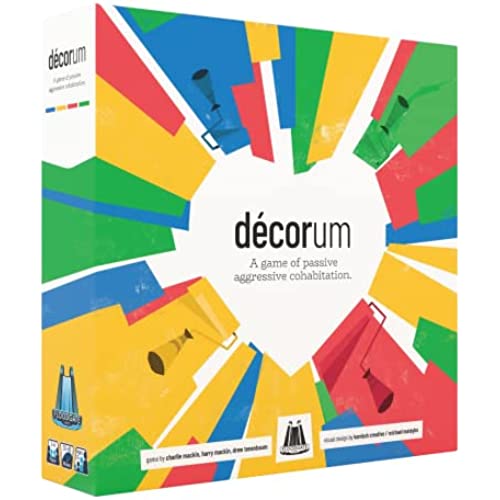
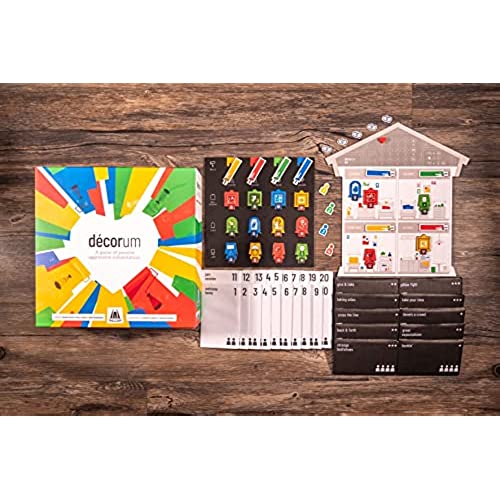
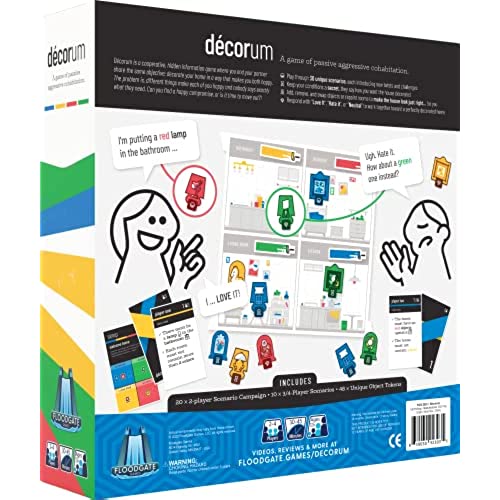
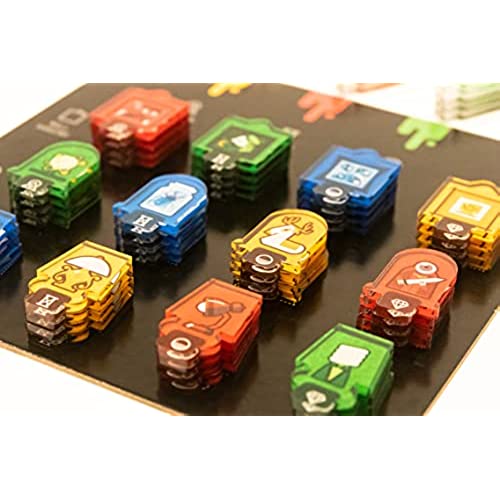
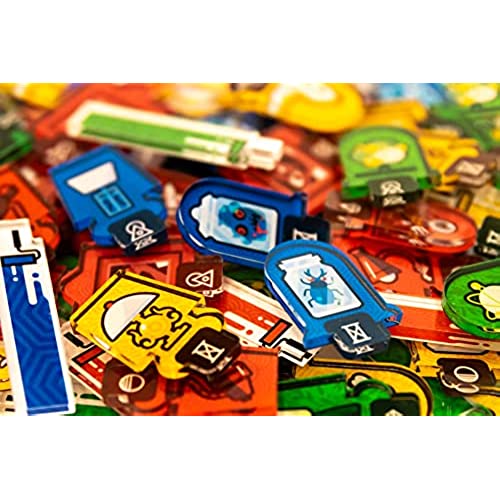
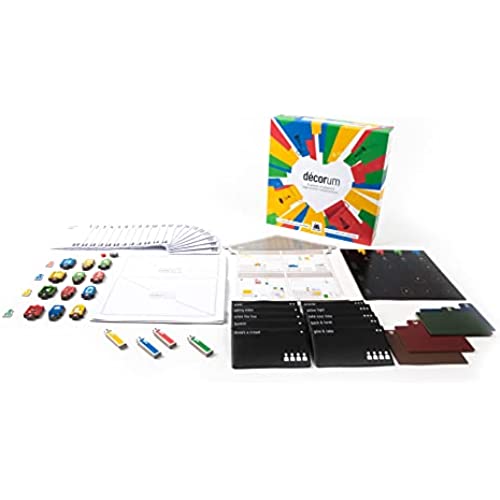
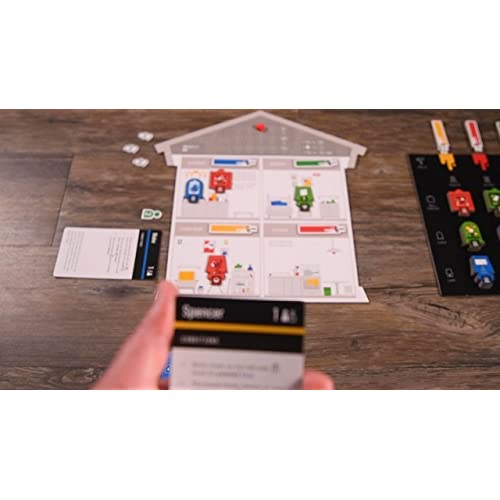







Floodgate Games Decorum (Deluxe Edition)
-

Ernest Flatt
> 24 hourThe deluxe edition was a great choice and has some fantastic acrylic tiles in the box.
-

Sa2
> 24 hourDuring the summer months I play a lot of board games with the kids, 9 &13. I read the instructions, and then re-read them just in case, to pickup on the mechanics, but there is a free video floating around on a famous site that hosts countless videos that a couple made that is a fantastic walkthrough for the game. From that point I was easily able to teach my daughter 9 and son 13 the gist of the game which they easily picked up on. The key in this game is to have everyone playing going in the same direction ruleswise and it will go much more smoother. Overall, a fantastic was to spend a hot summer afternoon in the house.
-

Evan Vedros
> 24 hourMy extremely competitive family didnt think theyd enjoy a cooperative game, but it quickly became our favorite of the year. Its extremely easy to learn, but theres a unique and fun layer of strategy to it.
-

Ida Nienow
> 24 hourI was sent the game in a damaged box. Company didn’t send the game in a any sort of box, just wrapped in a thin layer of plastic wrap. Game is fine, but not happy with how it was shipped and delivered.
-

New In Shrink
> 24 hourIf youve ever lived with anyone in your life youve likely faced a confrontation at some point where your aesthetic tastes are under fire and before you know it your prized singing bass wall hanging is on its way to the trash bin. Beauty is after all in the eye of the beholder and if youve ever tried decorating a home with your significant other, let your kids pick out paint colors for their rooms as they got older, or just shared an apartment with friends you know sometimes finding a harmonious blend of everyones styles that everyone can tolerate is hard. Décorum allows us to tackle the hidden frustration of a velvet painting of dogs playing poker being considered retro art and an antique lamp with a hideous tasseled lampshade being a cherished family heirloom that just cannot be parted with. The perfect blend of everyones style and preferences does exist but it is a puzzle that can only be solved by passive aggression and limited communication by players. Décorum is playable at 2-4 players but does set up slightly different scenarios and play styles according to player count. Out of the box two players will go through a set of twenty numbered story games that start slowly and build in both difficulty and intensity as you play. With 3-4 players the layout of the house changes ever so slightly and there minor rule changes to the separate game packets included for those player counts. So far weve played exclusively at two players and are into the last five of our twenty contained scenarios to play through. An initial question of replayability comes up with this game and I could say that even with the best of memories you could replay the original twenty scenarios just by switching character cards. Floodgate is working on an App though in the future that will later randomly generate plenty of randomly setup scenarios and combinations to continue playing well beyond what is included in the box. The game itself is one of limited communication and a simple set of actions. In decorating the perfect home each member of the home has conditions for what must or must not be present in the home for them to be fulfilled, other players have similar wants and dislikes, the combined conditions may overlap slightly or be in direct opposition at times, but within the opposition there is still room to negotiate. All of the homes different items, lamps, curios, and wall hangings exist in four different categories; antique, modern, retro, and unusual, so while Susan may want an antique wall hanging in the bedroom, Jill might find a compromise because they only needed the wall hanging to be a specific color. Décorum is a puzzle, in the end all the pieces fit together and form a solution, each player must work backwards from what they require fulfill their conditions and each turn you will make one change somewhere in the home. You will either add and object remove and object swap an object or paint a room and by combing this simple set of limited combinations each player makes a slight change each round, once a certain number of rounds has passed, 15, 20, or 25 with two players or every 5 rounds with 3-4 players the house occupants break their usual silent participation in the game and are allowed to read aloud one of the set conditions that is required for their card. If the person Im playing with has been adding green items to the home for several rounds and Ive been removing them each time remarking that I dislike or hate that move, then I might choose to share my condition that the home have zero green objects in it. In reaction that player may wish to tell me that they require at least two green objects or wall colors to be met on their card. Right there we collectively have solved that part of the puzzle set before us; we know have shared some hidden information and know that green walls are okay, green objects are not. Deciding what to share with the other player(s) on these meeting times is vital to finding a solution. What Im most loving about this is the silent playing; you make simple moves and then get either a positive, negative, or neutral reaction from that player. Examples are I like that I hate that or I dont mind that, as you play more and more and especially with the same player those affirmations sometimes devolve into simpler grunts of annoyance or whoops of joy when things go a certain way. I find this limited communication both funny and frustrating, you arent given much to go on but thinking out of the box and playing with all the options available can turn up interesting results. The rulebook is really good and has a great quick start setup page that lets you jump easily into your first games with only a minute or two of reading. Lastly, I found the flavor text on the character cards to be quite interesting, there are some ongoing story elements that you can follow along with and it chains together a loose narrative as you go along with some branching stories and couplings. I know some may skip over flavor text as unnecessary to read but in this case please dont pass it up, there are occasionally very subtle hints hidden in the text that can help with games. They are not huge hints but gentle nods to incorporate some immersion between story and gameplay that I enjoy. Whats not great are just a few smaller things, unlike most Floodgate games Im not really drawn into this one at all as a cohesive colorful world that I want to explore. The art and colors are simple and static, there isnt much to draw the eye in and keep you visually entertained which I miss while playing, you are pretty focused on the tasks at hand though so a simple and clean board with limited distractions is probably to your advantage but I found it lacking nonetheless. Beyond that, the complexity level isnt particularly challenging, after getting the hang of the flow we found the conditions easy to achieve with so few possibilities and repeated plays with the same person really clues you into which condition(s) you should reveal during heart to heart sessions. Our games fall well below the suggested playing time and have seemed a bit too easy to achieve, perhaps some of the future app generated ones can increase the difficulty or hopefully as we dive into the 3-4 player modes well find more challenge there. Weve had a good time with this one, Décorum set up a campaign type of feel with its numbered scenarios to complete so instead of just playing a few games of it and adding it back to the shelf we kept it nearby on the table and brought it our often to progress through the remaining scenarios pretty regularly, and we are still excited to finish up the last ones, even the simplicity and initial dislike for that is easily brushed away when we found we could play several games in a row and get an enjoyable game night out of them. For now were excited to finish up, explore other player counts, and see what the app has to offer. Décorum has been a puzzle weve enjoyed solving together, and being able to say fiercely and determinedly that I really hate that you just did that on your turn is a pleasing part of the game that just feels good.
-

LoveBoardGames
> 24 hourNumber of Players: 2-4 Duration: 30-45min Recommended Ages: 13+ Weight/Complexity: 1.5/5 according to BGG = its a light rules games Competitive/Co-operative: Co-op Type: Puzzle game Is this too true to life? I didnt realize how often many of us (of course not me...*cough*) are passive aggressive instead of communicating outright. Moving a lamp to one table only to find the others you live with move it to a different table. This game is all that and more. Each player has objectives and the only way to hint at their objective is by showing the other players through doing (change the paint color; move a piece of furniture, etc.) Recommended # of players: Two(2)...it just works better for me at this player count. Three(3) isnt too bad but four(4) is too many objectives messing with the play area. Similar to games like Fog of Love, Id recommend people role play as if they are someone other than themselves and/or have a different relationship to the other players than they may have in real life. Anything to make it so other players dont take it personal. The more you play this, the easier it becomes as each player more readily falls into the realization that each of you has a piece to the puzzle and working together so both can win is the goal...you just make passive aggressive changes to the shared home to get the win-win solution. Definitely worth getting the Deluxe version as the pieces are so much nicer to handle. This is definitely not strategic to the level of Chess or Tak (excellent 2-player game!). Id almost put it on par with many of the roll-and-write or flip-and-write games. Its a fairly quick play and some games are faster than others, but you dont feel brain dead from trying to play 3-5 steps ahead. I see this keeping a space in our collection as it is a unique game that is definitely worth trying.
-

Dr. D
> 24 hourI tend to be a big fan of cooperative deduction games, especially lately, but how does Decorum measure up? Lets find out and discuss five key elements of the game: MIX, 2.5 out of 5: 3+ PLAYER SCENARIOS. So Decorum is primarily a 2-player game. You have a multi-scenario campaign to go through with unlockable content, but they also threw in a bunch of 3-to-4-player scenarios. On the positive side, they work pretty well. Theyre basically one-offs, so you can just throw one down and try it out. I admit that its nice with such a limited core player count (2 players) and how they added this option. But on the negative side, I found the 3-to-4-player scenarios just a little bit too chaotic. As Ill discuss below, the deduction in this game is already kind of challenging and different than most games, and with that many players all trying to do their own goals at the same time, whew! I just found that to be a bit of a hot mess, along with the way that you kind of pass your cards off to each other to share secrets . . . I just found it tough to follow, honestly. Maybe thats my own quirk, but I didnt enjoy the 3-to-4-player play as much as I hoped I would. PRO, 5 out of 5: CATCH-UP REVEALING. So Decorum is a deductive game, but the scenarios are limited and they have very specific goals. With everyone doing pretty much their own thing, its kind of impossible for the game to have a hint system like a lot of other deductive games might have. But Decorum handles this problem nicely in a really smooth and straightforward way in that after a certain number of rounds, you get to tell each other what one of your goals is (you usually have 3, 4, or 5 on average). This is simple, but it works great. Whenever you do this, your score goes down, so if youre kind of trying to challenge yourselves to do your best, that gives you an incentive to figure things out more quickly. But since in a way these scenarios arent really replayable, I think it wouldnt be that fun if you just never solved anything, so getting these hints along the way and narrowing the focus of what you have to figure out makes the game feel satisfying each time. I never feel let down that I just couldnt solve the puzzle at all. MIX-to-PRO, 3.5 out of 5: SCENARIO REPLAYABILITY. For these kinds of deduction games, I usually always categorize scenario replayability as a mix because once youve played through all the scenarios, youve obviously seen all that the game has to offer. You cant really go through it again . . . or can you? I have to admit that I almost made this element of the game a pro because this is one of the most impressive of the limited play types of games that Ive seen for replay. The reason is the goals go in so many different directions and can sort of blend together that Ive literally played the exact same scenarios 3 or 4 days later with a different person, and I couldnt remember what the solution was. So Decorum is one of those games where you can put it away for a month and play through almost the entire game again and rediscover the solutions without any recollection at all. MIX, 2.5 out of 5: QUICK ACTIONS. In each turn, you do a very simple action. You pretty much either take something away from the board, put something onto the board, or you swich one thing with another. Thats pretty much it, and through those actions, you try to communicate what your goals are and also try to help the other person fulfill their goals once you kind of figure out what they are. The fact that these actions are so small, like only taking away one thing, can be both a blessing and a curse because on the positive side, choosing what the most efficient action is to give the most information is really interesting and tense. But on the negative side, it sometimes feels like youre doing too little, especially in 3 or 4-player games where you have to wait a little while. Also, spending your whole turn to take one thing away and then spending your whole entire next turn to put something else nearby . . . err, I dont know. Its not always that exciting. And sometimes close to the end, where youre just waiting for another player to give information, your best move is to take no action at all, and thats definitely not fun. PRO, 5 out of 5: THE DEDUCTION. Its like Im trying to figure out your goals, and youre trying to figure out mine as we put these things down, but theres limited communication in that all you can say is, I like that, I dont like that, or Im indifferent (or some other variations in how you say it). But whats really cool with this system, especially when I played with my wife in the 2-player game, is that it really feels like youre actually decorating a house or cooperatively trying to feel each other out for your preferences and your likes or dislikes. Its like, oh if I put this object down, does my wife hate red? Oooo she does! Maybe Ill switch that out with this, or oh no! She doesnt seem to like lamps! Lets move that over here. etc. Even though in some ways Decorum is a basic deduction game, it feels different (especially in the 2-player mode), and I just really enjoy it. I really appreciate it, and you get in this mindset or zen of feeling each other out. I think its a lot of fun. FINAL SCORE: 4 out of 5. Overall, I can wholeheartedly recommend Decorum to 2-player groups, especially couples. Its been a total hit for me and my wife, sort of getting on the same wavelength to try to solve these deductive puzzles. And if youre like me and you like cooperative deduction games, Decorum is probably at least worth a quick look, even if youre going to play it with 3 or 4 players because I do really think that the core gameplay is really fun. But on the other hand, if you dont like deduction, if you think youll never play it 2-player, or if you dont like the idea of really quick micro-actions and sometimes having nothing to do on your turn, then you might want to consider avoiding this one. Happy gaming! This is Dr. D, and Im out!
-

Becky Wilson
> 24 hourThis review has no reflection on the game play itself. Unfortunately, the game received had already been used or opened. It was missing the card dividers & the envelopes were roughed up. I noticed another review with the same issue, wonder if we got the same box! Can’t wait to get a new one to play the game!
-

Christina
> 24 hourFirst things to know: - This is not a competitive game. Its a cooperative game. You need to be in a cooperative mindset. - Its designed for ages 13+ and thats accurate. Youngers are probably not going to be able to understand the complexities of the game and cooperation needed. - Initial set up is lengthy. Recommend setting up before sitting down to play. Familiarize yourself with the game. - Very nicely made game. - Wonderfully unique idea! - Incredibly open ended. You can have a truly large number of game experiences depending on who plays, and the variables of the game. Pros: - This is a great game to build communication skills between players. - This is definitely a good conflict resolution skills learning game. Cons: - The instructions are a little confusing between two and four players. It says the same as the two player but then there are differences. It would be more convenient if the instructions that are the same for both two and four player were just written out and you are only reading the portion for the amount of players you have that round.
-

Z. Davisun
> 24 hourthis is a greatly fun game to play with two people up to four people. it tests your cooperative, negotiation, communication, comprehension, and other general people skills. I highly recommend this game for teens or pre-teen children, just to teach them those important interpeople skills early on in life. Had a blast playing this with my adult friends and kids alike!
